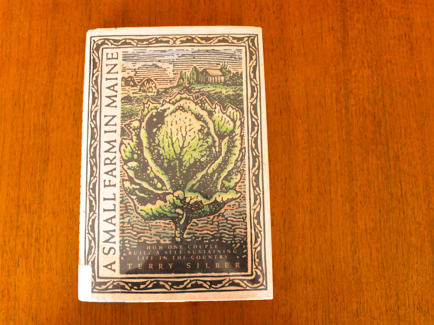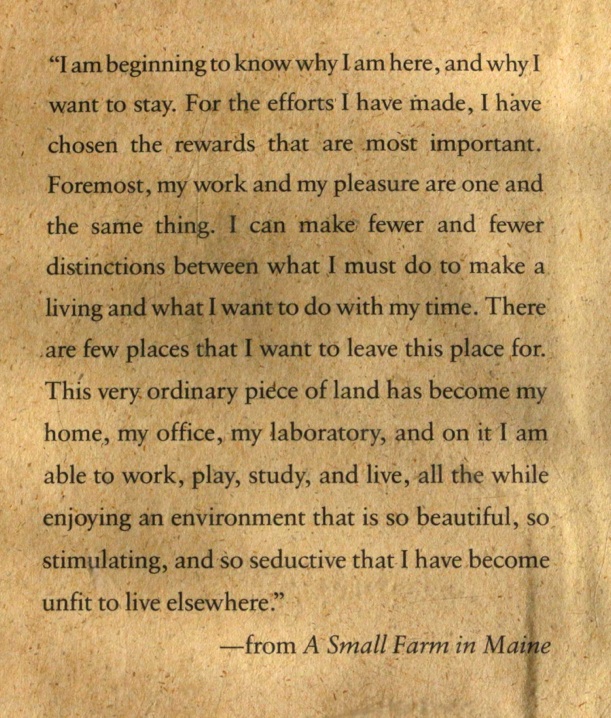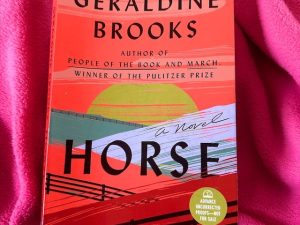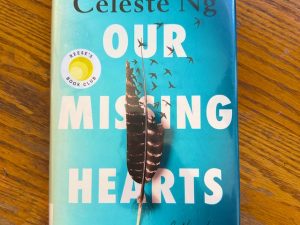
I really enjoyed this small volume and give it four stars. I chose to read it for my memoir class in September, but lingered over it. Now, when I could no longer renew it, I was finally motivated to stop savoring it so slowly and get on with finishing it. It was especially lovely to read a memoir that was all about positive growth. The challenges recorded here are about this couple’s learning curve in a new venture they knew nothing about, which I found both interesting and upbeat.
This is a very personal account of how a couple moved from a professional life in Boston –where she was the art director for Atlantic magazine and he was getting his PhD in Anthropology– to a self-sustaining life in the country. That trajectory is detailed in this book, which chronicles how you can learn what you want to on the spot, and with hard work, together with research, introspection, and common sense, it can pay off with a lifestyle you enjoy.
Here are some bits from the book to give you and taste of its flavor:
• “You planted, cultivated, and then harvested and packed a truck as full as possible with as great a variety of produce as you could manage. Then you got in your truck at first light and headed out carefully over bumpy country roads, trying to avoid the roughest spots so you could get your produce safely to the market. Assuming you didn’t have a flat tire, a broken heater hose, or goods blowing out the back of the vehicle, you arrived at the market in time to unload hundreds and hundreds of pounds of merchandise as quickly as possible. Then you tried to arrange everything into an appealing display while the inevitable handful of before-opening-hour shoppers were rifling through your best produce, handling it in ways that would have got your field hands fired. They were also peppering you with questions about the price of each and every item, long before you had a chance to make the decisions, let alone letter the price cards that had to be affixed to each of the containers on the display table. Then you had to set up the scales, which had not yet been inspected by the city inspector, who was, as it happened, rounding the corner at this very moment, with his briefcase of standard weights and seals in hand. The cash box, which you thought your partner had put in the front seat of the truck, had been left at the farm, so you rummaged around through your jacket and pants pockets to pull together enough change to get you through your first couple sales. Your first customer inevitably handed you a twenty, and you had to rush to the farmer next to you and beg some change so you could finish the sale…”
• “Our farming was rooted in our early pleasures of discovery and learning, and too the degree we continue to evaluate it in those terms and try to make its goals mesh with some economic realities, we are successful.”
• “Home growers will probably have the best luck with starting their own plants over heat mats and in cold frames, if they can curb their impulse to seed too early in the spring; the most common error I hear about from home growers is that they simply cannot wait to plant something so they inevitably end up with leggy, malnourished seedlings… A seed, once germinated, struggles to grow steadily into plant, flower, and fruit in an attempt to produce another seed and thus insure its survival. Every effort that can be made to assist that process and to guarantee smooth continuous growth will result in the healthiest and most vigorous individuals.”
• “The idea to buy our son a horse was so quickly agreed on that we had only a month in which to build a temporary shelter before the horse arrived. We bluffed Jacob into thinking that we were building a tool shed in the field behind the house, and he grudgingly agreed to help us, all the time wondering why we needed yet another outbuilding and wishing he didn’t have to help in the construction. On his birthday, a car and a horse van drove down our road, and we sent Jacob out to ‘see if it was a customer for the shop.’ The passenger in the car, rehearsed earlier by us, asked whether he was Jacob Silber, and when he replied that he was, she said, ‘Good, we’ve got something here for you.’ She and the driver got out of the car, opened the door of the van, walked Redigo out, and handed the lead rope to our son. This was one of the moments we will remember and talk about for the rest of our lives. Jacob was stunned, disbelieving, thrilled, and a little intimidated when the former owner and her friend left. Here we were with about nine-hundred pounds of young, excited, frightened horseflesh. Furthermore, we had not yet had time to finish the shelter, so one of us –Mark of course – had to climb on Redigo’s back (without the benefit of a saddle) and ride him about six miles to a neighbor’s farm where we could board him for the three days and nights it took us to finish our carpentry.”
• “This is the beginning of another adventure. With time, reading, and observing, I will gain a kind of literacy that I don’t now have.”
• “When I am troubled, I usually walk to the far stone wall, turning over the details of a mood, conscious that my walk is tense and aware of the impact of my feet as they hit the earth. When I reach the wall, by habit I head for a particular spot where the stones form a series of natural benches for sitting. My eyes are usually still focused on the minutiae of the land immediately before me. The process of working out my thoughts and tensions is accompanied by an increase in the distance of my gazing… When I retrace my steps to the house, my gaze invariably wanders from the ground at my feet to the larger landscape, and I am less aware of the impact of my feet on the ground. I don’t need to understand the mechanisms at work. I do need to know that the land will always release me from a claustrophobic vision.”
• “The country air of late summer evenings carries the most intoxicating aromas. There are some nights when the basils and salvias are so fragrant that we can detect them from hundreds of yards away. I walk through the gardens nearly every evening in mid to late summer, hours after the workday has formally finished but usually minutes before the last daylight. My footsteps release the dry, sweet smell of the hay mulch, and as I brush against different plants, I often do not need to see where I am to know what is next to me: dill, fennel, basil, mint, salvia, marigold, tomato, yarrow, artemisia, mustard, lavender, scented geranium… The mosses, having been heated by the day’s sunlight, give off a slight fragrance that is both sweet and dank – almost a metallic smell. If I step over the wall into the pine forest, particularly after several days of rain, the mushrooms have sprouted, and the smell always takes me back to my girlhood days at Girl Scout camp…”
• “The legacy I want to pass on to Jacob is one of fascination with the natural world.”
This book can be plodding in places, but I found it to be a worthwhile gem nonetheless. I was sad to note online that Hedgehog Hill Farm –after being named in 2005 as one of the 5 top destinations in New England by Yankee magazine– closed in August 2006. After reading this book, which was published in 1988, I had hoped to be able to visit.





